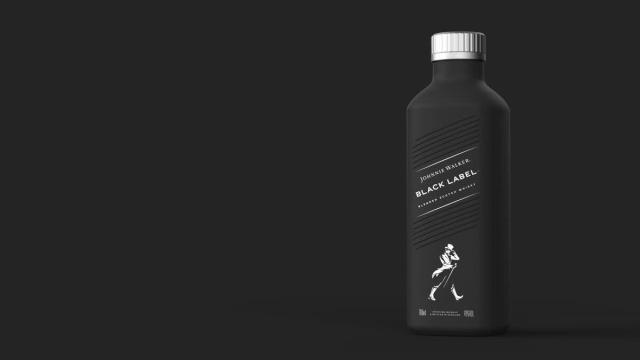When future civilisations look back at the geological record, one product will stand out dramatically from this time period: plastic. In an effort to stem the rising tide of plastic pollution just a bit, a top-selling whiskey will soon come in paper bottles. Don’t get excited just yet, though.
Diageo, one of the world’s largest beverage companies, announced Monday that Johnnie Walker bottles will be made with “sustainably sourced wood” starting in early 2021. The company claims the bottle will be fully recyclable. If it works this time around, the company hopes it can use this packaging for other drinks in the future.
This latest news is a piece of the Diageo’s longer-term strategy to improve its carbon footprint and overall environmental impact. For instance, the company announced on June 29 that it was going to build a carbon-neutral whiskey distillery. On June 11, it announced the use of recycled plastic bottles for Seagram’s 7 Crown American whiskey.
Cool, right? One million plastic bottles are purchased every minute, according to the United Nations. That’s a whole lot of plastic that often ends up in our oceans (and, apparently, our national parks and plants, too). Reducing the amount of plastic the world produces is undeniably a good thing. But what we really need to do is reduce the amount of waste the world produces, period. There’s an environmental cost to everything we produce, as well as to everything we recycle. So, sorry, Johnnie Walker. We can’t celebrate this just yet.
“While we appreciate that Johnnie Walker is recognising the severity of the plastic pollution problem and the need for companies to change their business practices to eliminate plastic waste, trading one disposable for another is not the solution,” Claire Arkin, the communications coordinator for the Global Alliance for Incinerator Alternatives, which advocates for zero waste, told Earther in an email. “Using paper packaging comes with its own set of problems: deforestation, potential toxicity, and barriers to effective recycling. Instead of continuing to rely on disposability and foisting the costs of that decision onto cities and consumers, companies must pioneer safe, reusable systems that conserve human and planetary health.”
Amy Moas, a senior forest campaigner at Greenpeace USA, told Earther via email, “nothing about Johnny Walker liquors’ move to paper packaging is sustainable.” She also flagged the need for zero-waste options for consumers and the environmental problems the pulp and paper industry creates.
Making paper bottles requires cutting down trees and that carries a cost, particularly for endangered animals and Indigenous people that live in or near forests being chopped down. Even if the outside of the new Johnnie Walker bottle truly is 100% recyclable, Moas said questioned whether the coating on the inside to keep the whiskey from soaking through is, too.
Diageo did not provide any info to Gizmodo on what these coatings are besides that they are not any type of per- and polyfluoroalkyl substances, better known as PFAS. Which is good because these can often be found in similar types of packaging and come with their own environmental and health concerns.
Many companies use a thin plastic coating on paper cups that make them harder to recycle. Some companies are moving to bioplastic-based alternatives. But even if it the coating is technically recyclable, Moas said “the vast majority of municipal recycling programs are not equipped to accept them at this time.”
Johnnie Walker may be trying to help the world become a better, less-polluted place. However, our boy Johnnie is going to have to do a lot more to help solve this gargantuan issue. Saving the planet isn’t as simple as switching from plastic to paper. Not when the problems are so much more complex and deeply woven into society.
